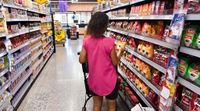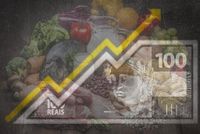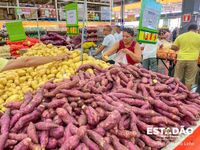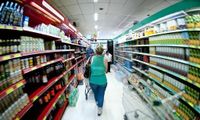The National Consumer Price Index (IPCA) reported a price increase of 0.56% in March 2025, according to data released on Friday, April 11, by the Brazilian Institute of Geography and Statistics (IBGE). This marks the largest increase for the month of March since 2003, when the index rose 0.71%. However, this figure represents a deceleration from February's inflation rate of 1.31%.
So far this year, the IPCA has accumulated a 2.04% increase, while the inflation rate over the past 12 months stands at 5.48%. This number exceeds the upper limit of the Central Bank of Brazil's target, which aims for annual inflation of 3%, considered achieved if it falls between 1.50% and 4.50%. The inflation for March aligns with financial market expectations that anticipated a rise of 0.56% in prices.
All nine groups surveyed by the IBGE experienced price increases in March, with Food and Beverages showing the most significant rise at 1.17%. This category accounted for approximately 45% of the March IPCA, with notable contributions from the price surges of tomatoes (22.55%), chicken eggs (13.13%), and ground coffee (8.14%).
Fernando Gonçalves, the manager of the IPCA survey, explained that the increase in tomato prices was driven by a lack of rainfall, which negatively impacted coffee crops. The heat accelerated the maturation of tomatoes earlier in the season, leading to reduced supply and higher prices. The rise in egg prices is attributed to the increased cost of corn, the primary feed for chickens, coupled with heightened demand during Lent, a period when egg consumption typically spikes.
In addition to food, the Transport group saw a variation of 0.46%, contributing a 0.09 percentage point impact on the index. This was a slowdown from February's increase of 0.61%. The surge in airfare prices, which jumped from a decrease of 20.46% in February to an increase of 6.91% in March, significantly influenced this category. Conversely, fuel prices moderated, with gasoline rising by 0.51% compared to a 2.78% increase in the previous month.
Other notable increases were seen in Personal Expenses, which rose by 0.70% in March, influenced by entertainment costs, particularly cinema and concert tickets, which surged by 7.76% due to the end of promotional cinema weeks in February. The Clothing group also recorded a 0.59% increase, with footwear and accessories (0.65%) and women's clothing (0.55%) leading the way.
The diffusion index for the IPCA in March was 61%, consistent with February’s figure but a reduction from January. This index measures how widespread inflation is across various items, with a decrease indicating that inflationary pressure was more concentrated in specific areas compared to previous months.
Additionally, the National Consumer Price Index (INPC), which tracks inflation for families earning between 1 and 5 minimum wages, rose by 0.51% in March after a significant increase of 1.48% in February. Over the past year, the INPC has accumulated a 5.20% increase.
In a regional breakdown, the highest variations in the IPCA were observed in Curitiba and Porto Alegre, both at 0.76%, followed closely by São Paulo at 0.71%. The quarter's accumulated inflation rates varied, with Aracaju reporting 2.66%, Vitória at 2.41%, and Curitiba at 2.24%.
As the Brazilian economy navigates these inflationary pressures, the government and the Central Bank will need to monitor these trends closely. The rising costs of essential goods, particularly food, could have significant implications for consumer spending and overall economic stability.
The upcoming IPCA results will be released on May 9, 2025, providing further insight into the trajectory of inflation in Brazil. With ongoing challenges such as climate impacts on agriculture and fluctuating global markets, the economic landscape remains complex and dynamic.








